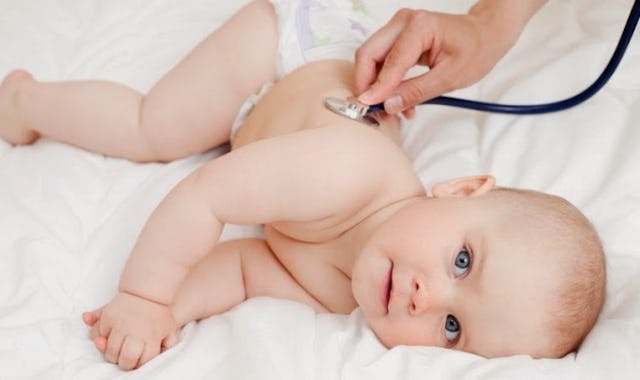What To Expect From Well Baby Visits

The first year of your baby’s life, you’re going to become very well acquainted with your pediatrician with weekly and then monthly well baby visits. You can expect a few basic checks at every appointment:
RELATED: 30+ Important Questions To Ask A Pediatrician Before The Baby Arrives
• Length/Height/Weight/Head Circumference – The doctor will take your baby’s measurements, record them in her file, and discuss with you her progress on a growth chart, as compared to other kids her age.
• Behavioral and Developmental Assessments – The doctor will ask you about your baby’s behaviors, including actions and reactions, and about milestones typical to her age, then make observations, and ask you if you have any questions or concerns. This is the rare opportunity to have a doctor’s undivided attention, so don’t be shy and ask those questions!
• Physical Exam – Your baby will get it all checked out; head, ears, eyes, mouth, skin, heart and lungs, abdomen, hips and legs, and genitals. What are they looking for?
Head. The doctor will check the soft spots (fontanels) on your baby’s head, and will also monitor the shape and size of your baby’s head as well.
Ears. The doctor will check for fluid or infection in your baby’s ears, and will assess your baby’s responses to various sounds. Eyes. The doctor will examine your baby’s eyes for things like blocked tear ducts or discharge, and will probably use a small flashlight to catch your baby’s attention and then track your baby’s eye movements. Mouth. The doctor will examine the inside of your baby’s for sores, red or swollen gums, or signs of oral thrush. As your baby gets older, her doctor will also ask about her feeding habits and talk about the signs of teething. Skin. The doctor will examine your baby’s skin for signs of birthmarks or rashes. Heart and lungs. The doctor will monitor your baby’s heart and lungs with a stethoscope to listen for any abnormal sounds or breathing difficulties. Abdomen. The doctor will gently press or massage your baby’s abdomen in order to detect any tenderness, enlarged organs or hernias. Hips and legs. The doctor will move your baby’s legs in a bicycle-like motion to check for any dislocation or other problems with the hip joints. Genitals. The doctor will remove your baby’s diaper and inspect for tenderness, rash, lumps or other signs of infection. If your baby is a boy, the doctor will make sure his testes have descended into his scotum. For girls, the doctor will ask about vaginal discharge. Be sure to look on top of things and bring a clean diaper to the check up.
• Vaccinations. Unfortunately.
• And, finally: Ohhing and ahhhing over your baby in the waiting room. Try not to be freaked out by the toddler or teen mother staring at you – she’s not really plotting to steal your baby, she’s just remembering the good old days. Yes, new mommy, these are the good old days.
Want more specifics about each visit?
Newborn Visit One Month Visit Two Month Visit Four Month Visit Six Month Visit Nine Month Visit Twelve Month Visit
View the entire Scary Mommy Baby Guide
This article was originally published on